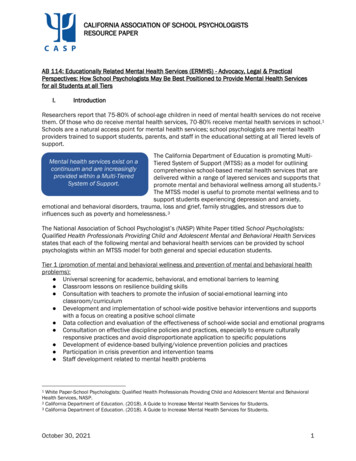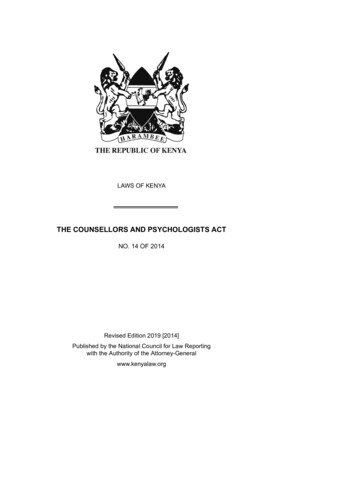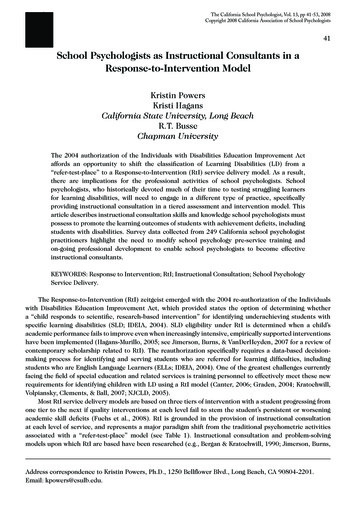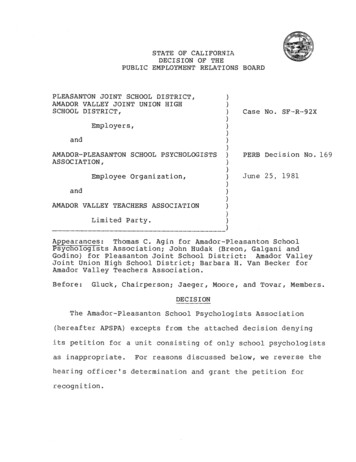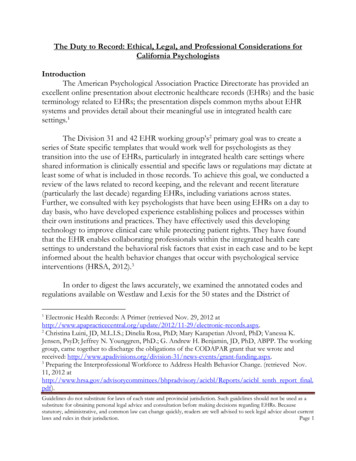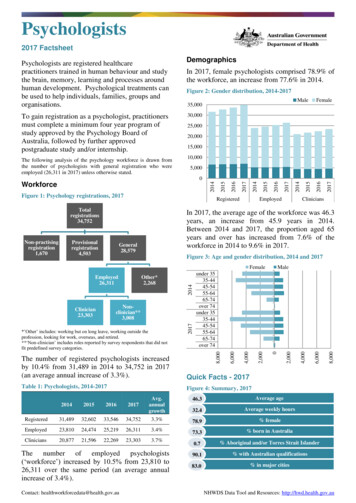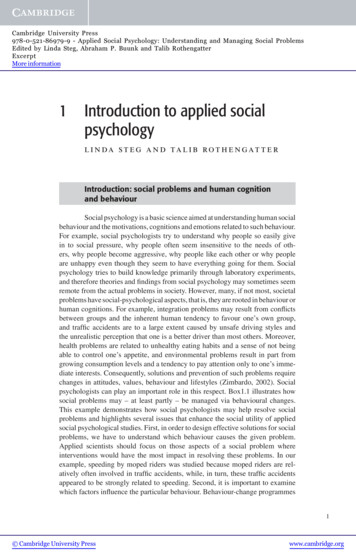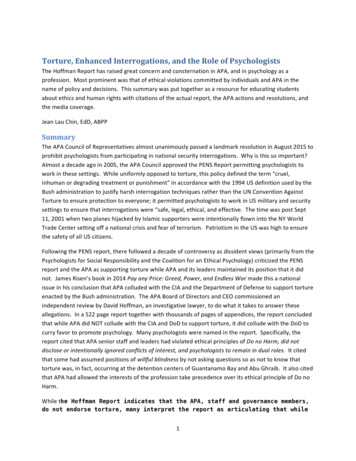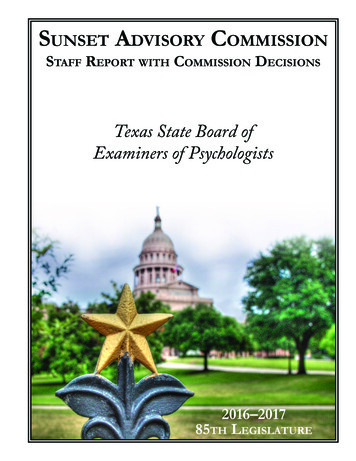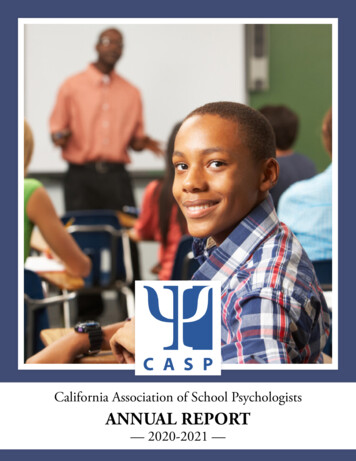
Transcription
California Association of School PsychologistsANNUAL REPORT— 2020-2021 —
About CASPVision StatementThe Vision of the California Association of School Psychologists is to foster the social, emotional and academicwellbeing of all students by collaborating with families, school staff, and the community to ensure that students areeducated in schools that support equity, access, and respect for all.Mission StatementThe CASP mission is to foster the wellbeing of the children, schools and communities we serve through legislativeadvocacy, professional development, communications, publications, ethics guidelines, and direct services tomembers.Contact UsPhone: (916) 444-1595Fax: (916) 444-1597Website: casponline.orgAddress: 3841 North Freeway Boulevard Suite #100, Sacramento CA 95834Table of ContentsTable of Contents2President's Message3Region Updates4Financials7Committees and Specialists812Board of Directors2
President's MessageWhat an extraordinary year! When I began my termas President in July 2020, the world was in the throesof the COVID-19 pandemic and racial upheavals. Wewere uncertain about school openings, Convention, andwhat the road ahead would look like. When deciding ona theme for the 2020 Convention (in 2019), I did notrealize how prescient “Unmasking the Potential of AllStudents” would turn out to be. The pandemic lifted theveil masking numerous inequities faced by many of ourstudents, exposing the gaps in our system and how wemust work together to fill them.I am proud to say that CASP answered this call toaction and persevered in meeting such unprecedentedchallenges. We pivoted and actively created resourcesto help our members serve their students and schoolcommunities. These challenging times also provided usthe opportunity to grow. We were able to strengthen ourconnections— with our board, affiliates, staff, partners,and members.Most importantly, CASP built stronger connections withCalifornia Deartent of Education (CDE) and the statelegislature. If you’re not at the table, you’re on the table– this year CASP was at the table more than ever before.We were invited as leaders and experts in the field todiscuss mental health and education. We participated inpodcasts, interviews, webinars, roundtable discussions,and professional developments.When the pandemic began, State Superintendent ofPublic Instruction, Tony Thurmond, recognized theneed to convene school and community mental healthproviders in one group. Superintendent Thurmondorganized a group including Surgeon General NadineBurke, Pupil Personnel Services (PPS) credentialed3providers, and community-based organizations tocoordinate student mental health services. Withthree representatives in the group, CASP shared theunique position of school psychologists in severalmeetings throughout the year. We are participating inconversations and leading the change we want to see inthe world with our collaborations with local districts andstate government agencies.CASP also built stronger relationships with our fellowPPS associations. We collaborated with the SchoolCounselors and School Social Workers’ Associations todevelop Fostering the Whole Child: A Guide to SchoolBased Mental Health Services. Our goal was to helpadministrators get a better understanding of the PPSroles in schools. I also had the pleasure of being on twopanels with the Presidents of the School Social Workersand Counselors Associations, focusing on the guide. Forthe first time ever, the three associations also publisheda joint position statement (School-based Mental Health:School and Community Partnerships).Early in the pandemic, the Mental Health ServicesOversight and Accountability Commission released itsreport: Every Young Heart and Mind: School as Centersof Wellness. We successfully advocated for the finalreport to include more information on PPS providers, asthe original draft mentioned us minimally.We worked hard this year to pivot to virtual learning.Our first virtual Convention was a success with over1,000 attendees and a record number of CEU/CPDcertificates issued. Of course, we would have preferredto see everyone in person, but we made the best of thesituation. We are grateful to our members, attendees,and presenters for their flexibility as we transitionedto the virtual platform. OutsideConvention, our ProfessionalDevelopment Committee, with ourCommittee Chairs and Specialists,also hosted several virtual couchchats and webinars.In a final extraordinary first forCASP, our membership votedto extend my term as Presidentfor an additional year, to provideconsistency throughout thepandemic. I can’t wait to do thistogether, again - let’s do it!
Region UpdatesRegion II: GREATER BAY AREARepresenting the counties of Alameda, Contra Costa,Monterey, San Benito, San Francisco, San Mateo, SantaClara, and Santa Cruz.Despite the struggles of COVID-19 school closuresand the inability to host in-person events, RegionII’s affiliates continued to gain members and providenumerous well attended online trainings.Santa Clara County Association of School Psychologists(SCCASP) provided eight different online trainingsand held over 150 active members. Upcoming trainingsinclude Avoiding Burnout (12/21), SupportingExecutive Skills (1/22), and Using PASS Theory forPSW (4/22).Bay Area Association of School Psychologists (BAASP)grew to over 60 active members and partnered withother CASP affiliates to offer six virtual trainings duringthe past year. BAASP provided a legal training for thepost-pandemic return to school in August. Additionaltraining opportunities will be posted via the BAASPwebsite soon.Author: Michael Giambona Ph. D., Region IIRepresentative December 2020 LGBTQ : Inclusive Practices and Counselingwith Amy Cannava January 2021 Social/Emotional Assessment and ERMHS withMichael Hass February 2021 Dyslexia with Jana Parker March 2021 Let’s Talk About Burnout with Deni Dayan April 2021 EL Assessments with Dr. Pedro Olvera May 2021 The Neuropsychology of Stress and Trauma:Trauma-Informed Schools and Assessment withSteven FeiferREGION III: SAN JOAQUIN VALLEYRepresenting the counties of Fresno, Kern, Kings, Inyo,Madera, Mariposa, Merced, Stanislaus, and Tulare.Region III has two active affiliates: The Central ValleyAssociation of School Psychologists (CVA-CASP) andThe Kern Association of School Psychologists (KASP).KASP ended the 2020-2021 school year with 156 activemembers, and CVA-CASP had 263! They were both ableto provide the following virtual trainings this past year: September 2020 Legal Update with Kathleen McDonald from theF3 Legal Firm October 2020 Legally Defensible SLD Assessment with Dr.James Hiramoto Tips For Transitioning Special Needs LearnersBack to School with Valerie De Fehr4Author: Cassandra Rivera, Region III RepresentativeREGION V: SOUTH AND EASTLos Angeles County.Greater Long Beach Association of School Psychologists(GLBASP) held two workshops. The first was withCarl Corbin on Legally Defensible Practices with EDAssessment, Provision of ERMHS, and COVID-19Updates. The second was with Dr. Farzana Saleem onAddressing Social Injustice and Racial Climate WithinSchools.With the revenue generated through the workshops,GLBASP made a charitable donation to their guidancecenter.Author: Jana Baker, Region V Representative
REGION VI: INLAND EMPIREREGION VII: WAY SOUTH REGIONRepresenting the counties of Riverside andSan Bernardino.The Riverside Association of School Psychologist (RASP)focused on three initiatives this past year: hosting guestspeakers, supporting student membership, and buildingrelationships with California legislators. In September,Carl Corbin provided a workshop on Legally DefensibleAssessments and Report Writing During a COVID-19Era, which included guidance with remote assessment.This event was tied to the RASP membership drive,which resulted in over 115 members joining. InMarch, Dr. Steven Feifer conducted a workshop on theNeuropsychology of Mathematics: An Introductionto FAM, which provided insight with how the brainprocesses mathematical information and guidance forintervention.RASP continues to expand support for graduate studentsfrom local universities. For the first time, RASP hadstudent liaisons from seven universities attend boardmeetings. They provided insight into the needs ofinterns, promoted workshops, and increased awarenessof belonging to CASP and RASP. In April, RASP heldits 2nd annual Virtual Mock Interviews for studentinterns. Over the course of two sessions, members ofthe Board of Directors simulated a group interviewwith 13 graduating students. They had an opportunityto answer typical questions and received feedback onways to approach the questions, alternative ways toanswer questions succinctly, and strategies for developingrapport with the interview panel. And finally, RASPsurveyed local graduate students about how RASP couldimprove support for practicum and intern students.Common themes included high quality webinars,mentorship, establishing a network for practicum andintern students, in-person assessment practices, andreport writing.The RASP Board of Directors initiated for the first timea meet and greet with the staff of two state senators andtwo Assembly members representing the Inland Empire.This was an opportunity for outlining the role of theschool psychologist as a full-service provider, advocatingon behalf of the need for mental health services, anddiscussing current and future legislation that CASPsupports. Each meeting ended with RASP’s commitmentto continue developing a relationship with each legislatorin support of the students in their local community.Author: Richard J Kleindienst, PhD, Region VIRepresentativeRepresenting the counties of Imperial and San Diego.The 2020-2021 school year saw San Diego CountyAssociation of School Psychologists (SANDCASP)make the shift, along with the rest of the world, to avirtual space. Despite the challenges of COVID-19,they continued to offer professional development, socialgatherings, and an online job fair. The SANDCASPBoard of Directors approved updates to the missionstatement and board policies to reflect a commitmentto social justice, equity, and inclusion. SANDCASPhosted four workshops on topics ranging from dyslexia,identifying emotional disturbance, educationally relatedmental health services, and anxiety and depression in theage of COVID-19. Membership continued to thrive,and thanks to the use of online platforms, many morepeople from outside of the region were able to access andparticipate in events.Due to the lower overhead costs, SANDCASPexperienced a surplus of funds this year and the Board ofDirectors voted to make charitable contributions to localnonprofit organizations based on member nominations.Additionally, SANDCASP donated funds to CASP.To wrap up the year, SANDCASP held their annualend-of-the-year event, where they honored fellowcolleagues and school psychologist graduate students.We congratulate Sherri Wexler, recipient of theOutstanding School Psychologist Award, and RubenSanchez, recipient of the Ross Zatlin Mentorship Award.Additionally, SANDCASP awarded the Dr. ValerieCook-Morales Scholarship to Shafiq Nashashibi.SANDCASP held board member elections in May andis excited to welcome Dorothy Guinter as Presidentand Heather Lutz as President-Elect for the 2021-2022school year, along with the rest of the newly electedboard: Kathy Pawlukiewicz, Past-President; AdrienneGarcia, Secretary; Rodrigo Enciso, Treasurer; andMembers At-Large: Jenny Dowlan-Steen, Jarrett Clifton,Celeste Garcia, Linda Breslin, Janet Coover, MelissaMartin, Cheyenne Sanford, and Andrea Lacuesta.Author: Kristin Singh, Region VII Representative5
REGION IX: ORANGE COUNTYREGION X: SACRAMENTO VALLEYJanuary 2021 was the first time Orange CountyAssociation of School Psychologists (OCASP) held theirAnnual Student Workshop as a virtual presentation, andit was quite a success. The annual Student Workshopwas opened to students and interns across the state.The workshop discussed next steps in their futurecareers; from what to expect in their training to how toapply and interview for the job. Additionally, SpecialEducation Local Plan Area (SELPA) Directors fromGreater Anaheim, Irvine, and Saddleback were able tojoin as panel members to answer questions and providefurther guidance to students.In Spring, OCASP was joined by Jenny Ponzuric topresent on “Cross Battery Assessment & Dyslexia.”School Psychologists and practitioners across the statealso joined this highly sought-after presentation.Author: Giniena Tan, Region IX RepresentativeRepresenting the counties of Alpine, Amador, Butte,Calaveras, Colusa, El Dorado, Glenn, Lassen, Modoc,Mono, Nevada, Placer, Plumas, Sacramento, SanJoaquin, Shasta, Sierra, Siskiyou, Solano, Sutter,Tehama, Tuolumne, Yolo, and Yuba.The 2020 – 2021 school year was a unique one. Mostof the year was conducted over distance learning, soeveryone had to adapt to a whole new way of doingthings! The Elk Grove Regional Association of SchoolPsychologists (EGRASP) also spent the year adaptingto an alternative way of conducting workshops. Tomeet the challenge and make things easier for ourmembers, we did not charge for affiliate membership.All of our workshops were free and members only paidif they desired CEUs. The three main workshops weheld virtually were Digital Assessments by our friendsat WPS, Neuropsychology of Written Language by Dr.Feifer, and Suicide Prevention by Dr. Brock. EGRASPalso sponsored a virtual booth during the CASP SpringInstitute!Author: Armando Fernandez MS, L.E.P, Region XRepresentative6
FinancialsAlthough challenged by the inability to hold inperson events, CASP was able to end the year in astrong financial position. A combination of costcutting measures, a successful virtual Convention, andsignificant Covid-19 relief funds contributed to thisposition. Most Covid-19 funds were received late inthe fiscal year under the CARES-2 act. Specifically,CASP received a (now forgiven) Paycheck ProtectionProgram loan of 47,557; a 25,000 employee retentiontax credit; a 15,000 relief grant from the State ofCalifornia; and a repayable 149,900 economic injuryStatement of ActivitiesIncomeMembershipEventsPublicationsOther IncomeTotal Income 220,108 222,060 24,311 316,642 783,121ExpensesBoard and CommitteesAdvocacyEventsCommunicationsInformation TechnologyAdministrationPersonnelTotal ExpensesNet Income 745 24,567 21,301 17,215 4,545 121,526 222,244 412,142 370,9807disaster loan.I hereby certify that I am an authorized officer of theAssociation and that the following financial reports wereprepared without audit from the books and records ofthe Association.Amy Balmanno, Secretary/TreasurerBalance SheetAssetsChecking / SavingsAccounts ReceivableOther Current AssetsTotal Current AssetsFixed AssetsTotal AssetsLiabilities & EquityAccounts PayableOther Current LiabilitiesTotal Current LiabilitiesLong Term LiabilitiesUnrestricted Net AssetsNet IncomesTotal Liabilites & Equity 657,391- 3,661 25,760 679,491 2,913 682,404 356 120,767 125,753 149,900 185,875 220,875 682,404
Committees and SpecialistsCharter and Alternative Settings CommitteeDuring the 2020-2021 school year, the Charterand Alternative Settings Committee met four times(December, February, April, and June). During thosesessions, we developed short and long-term goals for ourcommittee, and worked to make those goals a reality.Our goals that were developed included:Short-Term Goals (things we could feasibly do withinthe current school year): CASP connecting with El Dorado CountyDepartment of Education (EDCOE) Charter SpecialEducation Local Plan Area (SELPA) to supportpsychologists Obtain/Create List of NPS that charters can use. Collaborate with Legislative Committee to developan advocacy program for charters.Long-Term Goals (things we could feasibly do over thenext 2-3 years): Provide a CASP training to charter organizationswhere we cover the role of school psychologists,tools, and best practices.Accomplishments of the committee included thefollowing: Connected with a program specialist at EDCOESELPA, who shared resources on non-public andresidential treatment centers and upcoming trainingsto support charter psychologists. Met with the CASP Legislative Committee Chairto discuss how the Charter Committee can stayconnected re: advocacy for charter schools. I haveattended Legislative Committee meetings to stay upto date on relevant bills and share information withour committee. Touched base with the CASP MembershipCommittee to discuss recruitment of charter schooland alternative settings psychologists. Linked up with the California Charter SchoolAssociation (CCSA) to discuss partnerships betweenCCSA and CASP and develop a relationship tosupport psychologists in charter and alternativesettings. Gina Plate, their Special EducationVice President, attended one of our committeemeetings to discuss federal and state funding and8how this impacts charter management. It was veryinformative.Author: Katie Petterson, Charter and AlternativeSettings Committee ChairCommunications CommitteeCASP Communications Committee 2020-21 ActionsCo-Chairs: Doug Siembieda and Barbara D’IncauMission: Promote School Psychologists as the mental healthprofessionals in the educational setting. Promote School Psychologists as the professionalleaders on district’s Multi-Tiered System of Supports(MTSS) development (RtI2, PBIS, SEL/MH), tieredinterventions, and data assessment systems. Educate staff/community about our skill set asmental health providers, legal obligations in jobdescription. Educate on the benefits of counseling for staff andstudents. Promote culture of advocacy for the profession. Advocate for graduate programs to emphasize mentalhealth counseling skills and role as mental healthproviders.Activities:Co-chairs developed position statements andannouncements for CASP members: Researched and wrote a CASP Position Statement:“Countering Acts of Violence and Hate SpeechToward Asian Americans”, with links to CASP,National Association of School Psychologists(NASP) and other documents to assist schoolpsychologists in supporting and protecting AsianAmerican students. Addressed systemic racism and drafted a statementfor members on the Black Lives Matter movementand provided resources to help students andeducators process feelings and personal experiencesrelated to the deaths of George Floyd, BreonnaTaylor, Ahmaud Arbery, and others, as well as linksto resources such as “Talking to Children AboutViolence.”
Requirements related to COVID-19 status andCenter for Disease Control recommendations forstudents and schools. Developed communications to members regardingone-time federal to state COVID-19 funding toLocal Education Agencies (LEAs) so that schoolpsychologists could advocate strongly to districtadministration and school boards to provide andsustain funding for: Student mental health Trauma-informed care for students and staff Need for increased hiring of school psychologiststo respond to the significant increase in studentmental health issues Outreach to staff, parents, and the community Restorative justice practices to promote equityand students’ psychological safety Our statement and continued commitment to CASPmembers is:“CASP’s guiding vision is to foster the social,emotional and academic wellbeing of all studentsand to ensure that students are educated in schoolsthat support equity, access, and respect for all.We know that our vision cannot be fully realizedwhile Black, Brown, Asian, LGBTQ and othermarginalized children suffer from continued inequityand racial trauma.So, we make a promise to listen, to honor the wisdomof our communities of color and minority youth ofCalifornia, to stand for justice, and to support thehealing that must occur. We must confront inequityand stand in solidarity with those who are struggling forjustice and peace.”Author: Barbara D’Incau & Doug Siembieda, Co-Chairsof Communications CommitteeContemporary School Psychology (CSP)Despite the pandemic, 2020 was a big year forContemporary School Psychology (CSP). We published76 articles across four issues on a wide range of topics.These included a special issue on “Addressing Aggressionand Violence in Diverse School Settings,” guest-editedby Steve Brock and Mellissa Holland of SacramentoState University. In 2021, we published special issues orsections on “Critical Training Topics Series: Meeting theNeeds of a Diverse Nation,” “The Fortieth Anniversaryof Larry P. V. Riles: Cognitive Assessment and BlackChildren,” and “School Psychology and COVID-19.”9With over 92,000 downloads in 2020, CSP continuesto be an essential source of scholarly knowledge forpractitioners and academics in California, the nation,and, increasingly, the world.At the end of 2023, CASP’s contract with SpringerPublications will be up for renewal. At the same time,I will step down as Editor-in-Chief. CASP will beginsearching for a new Editor-in-Chief in the spring of2022 and, by the fall of 2022, will have decided to eitherrenew our contract with Springer or seek out anotherpublisher.Author: Michael Hass, Editor in Chief of ContemporarySchool PsychologyEthics CommitteeThe CASP Ethics Committee has been working on avariety of projects for CASP members. The committeefirst fully revised the Code of Ethics and had it approvedby the Board of Directors in Spring 2020, shortly afterthe initial COVID-19 shutdown commenced. This ledto a whole new world with questions around telehealthand assessment, so the team once again worked toupdate the Code of Ethics to reflect our ever-changingtimes. This will be presented to the Board in October forapproval.Our second project was the writing of two articles forCASP Today, including “Ethics in a Time of COVID-19Tele-Counseling” (Tom Sopp and Kristin Makena), and“Ethics in a COVID World” (Kristin Makena). Duringthis time, we experienced a host of ethical dilemmasbrought about by our entry into distance learning.These articles highlighted some of the issues SchoolPsychologists and LEPs faced during this time andpresented guidance for moving forward amongst all thechanges brought about by the pandemic.Finally, we created the Ethics for Graduate Studentstraining at the CASP 2021 Spring Institute andcontinued with the Ethics for School PsychologistsTraining as well. The Ethics Committee continues tofield questions from CASP members in an ongoingeffort to support their work in ethical and legal ways toensure students in California have the best support wecan provide.We would like to thank the following committeemembers and contributors for their work to supportCASP and the Ethics Committee:Ethics/ Professional Standards Specialist: Kristin MakenaEthics Committee Members and Contributors: Amy
Balmanno, Wendell Callahan, Mike Giambona, ChrisJones, Annie Ovanessian, Jenny Ponzuric, Wilda LaijaRodriquez, Kristin Singh, Tom Sopp, and Melissa WoodAuthor: Kristin Makena, Specialist, Ethics/ ProfessionalStandardsMental Health Committee2020-2021 CASP Mental Health CommitteeThe CASP Mental Health Committee responded to theCOVID-19 pandemic’s effects on California’s studentsand school systems by accomplishing quite a fewthings this year. These activities included writing CASPposition papers and articles for CASP Today, presentinga variety of webinars (via CASPCON, Spring Institute,Association of California School Administrators(ACSA), CASP Legislative Action Day, Los AngelesCounty Office of Education (LACOE), CaliforniaDepartment of Education’s (CDE’s) Project Cal-Well,Stanislaus COE, and California State University,Sacramento), hosting a coffee chat for the Los AngelesCOE, participating in CDE’s workgroups, providinginput on Medical Health Operation Area Coordinator(MHOAC) items regarding youth mental health andschool psychologists as mental health professionals, andcollaborating on proposed mental health bills.Members: Melissa Wood, Sue Coats, Tom Sopp, NelarieRomo, Meagan O’Malley, Stephanie Murray, MichaelHass, Armando Fernandez, Michael Giambona.Joint Projects: CASC, CASW, CASP – “School-Based MentalHealth: School and Community Partnerships” CASC, CASW, CASP – “Fostering the WholeChild A GUIDE TO SCHOOL-BASED MENTALHEALTH PROFESSIONALS”Coffee Chats/Webinars: 2020 CASPCON: Can You Monitor All Students'Social Emotional Wellness? Baldwin Park USD Mental Health Virtual WellnessFair: Resilience Webinar Cal State University, Sacramento, school psychologyinterns, webinar presentation on MH MTSSFramework, SEL, and Universal Screening Cal State University, Sacramento’s The RoadTo Resilience Conference: A MTSS Model ofCoVitality Implementation CASP & LACOE: Let it Go: Defrost this WinterBreak with Self-Care10 CASP & LACOE: Welcome Back! Now What? CASP & LACOE Coffee Chat: Q and A RegardingCASP’s Resource Paper-School Psychology Practicesduring COVID CASP Fall Convention & ACSA Every ChildCounts Conference: Educationally Related MentalHealth Services (ERMHS)- Advocacy, Legal, &Practical Perspectives CASP Legislative Action Day: CASP Mental Health& Wellness Advocacy Planning CASP Spring Institute: Welcome Back! Now What? CDE Project Cal-Well: A MTSS Model ofCoVitality Implementation Stanislaus COE: A MTSS Model of CoVitalityImplementationCASP Member Meetings/Involvement: 2020-2021 CDE Student Mental Health PolicyWorkgroup, quarterly meetings 2020-2021 CDE Suicide Prevention Committee,bi-monthly meetings CASP Legislative Committee, reading and input onproposed California MH bills CASP Mental Health & Wellness Committee (Cochair), monthly meetings MHOAC Hearings and Every Heart and Mind:Schools as Centers of Wellness reading/input MTSS Committee & Emergency/Natural Disastersmeeting NASP 2021 Virtual Regional Leadership Meeting(RLM) SB 699 Consultation SB 75 WorkgroupCASP Today: Book review: “Permission to Feel: Unlocking thePower of Emotions to Help Our Kids, Ourselves,and Our Society Thrive” “May Mental Health Awareness and BOEResolutions” articleSubmitted by: Dr. Sue Coates, LEP and Tom Sopp –Co-Chairs, Mental Health CommitteeLegislative CommitteeThe Legislative Committee had a busy year developingpartnerships and reviewing bills that impact schoolpsychologists, the profession, and the students and
families we serve. The committee held Legislative ActionDay (LAD) in April 2021. Several committee chairsand members also presented during LAD to a varietyof participants. Topics ranges from advocacy to publicfinance and mental health advocacy.The committee reviewed and analyzed over 50 bills ina variety of areas including special education, studenthealth & wellness, school safety, pupil discipline, andschool start time. Many of the bills that were reviewedresulted in CASP taking a ‘support’ position.The committee also reviewed major items that wereincluded in the Children & Youth Behavioral HealthInitiative from the California Health & Human ServicesAgency. This initiative included many items related tostudent mental health needs including medical benefitsand a school behavioral health workforce.The committee also reviewed and changed ourorganization’s legislative platform and maderecommendations to the Board of Directors foradoption. CASP has established the following criticalpriority areas for 2021-2022. Ensure appropriate psychological, social-emotional,and mental health services in the school setting,including universal school-wide prevention andeducation such as Positive Behavior Interventionand Supports (PBIS) and MTSS for students inneed of academic, behavioral, and social-emotionalinterventions and that these supports are provided byappropriately qualified school-based mental healthpractitioners. Ensure adequate funding for K-12 education, specialeducation and related services, and evidence-basedinterventions that prepare students for their ownpath in life including college and career readiness. Achieve equity and access to high quality educationalprograms for all students; reduce disproportionalityin discipline practices and special educationidentification and placement. Expand access to quality early childhood educationprograms for California’s young children andfamilies. Reduce the shortage of school psychologists byincreasing school psychology graduate programs andreducing barriers to out of state school psychologyinterns.The committee also participated in two legislativebriefings (virtually, of course) in November 2020 andMarch 2021. These legislative briefing allowed ourcommittee members as well as other stakeholders from11the California Association of School Counselors andthe California Association of School Social Workers toprovide information to legislative staff in Sacramentorelated to the needs of the students and families thatwe serve and how our professions help meet theseneeds. This was a great opportunity for CASP to informthe people who draft the legislation that impact ourprofession and our families.Author: Reynaldo Vargas, Legislative and AdvocacyChairPosition Paper CommitteeOur committee was hard at work providing guidancefor school psychologists during this unprecedentedyear. In July 2020, our committee met several times toput together our first resource paper that was releasedin August 2020: “School Psychology Practice duringCOVID Series #1 - Assessment Guidance.” Shortly afterthat paper was released, our team met again to discuss theever-changing landscape of assessments and COVID-19.We drafted our second in the series of resource papersin October 2019: “School Psychology Practice duringCOVID Series #2 - Updated Assessment Guidance &Four Specific Eligibility Areas Guidance.” In November2020, a team including our Position Paper Chair, ourCASP President, Jeannine Topalian, and CASP member,Ivonne Watson, were asked to present at a virtual webinarfor the California Department of Education: “EnsuringSafe Assessments for eligibility under IDEA.”Social justice and systemic racism were also importantissues aff
The 2020-2021 school year saw San Diego County Association of School Psychologists (SANDCASP) make the shift, along with the rest of the world, to a virtual space. Despite the challenges of COVID-19, they continued to offer professional development, social gatherings, and an online job fair. The SANDCASP
